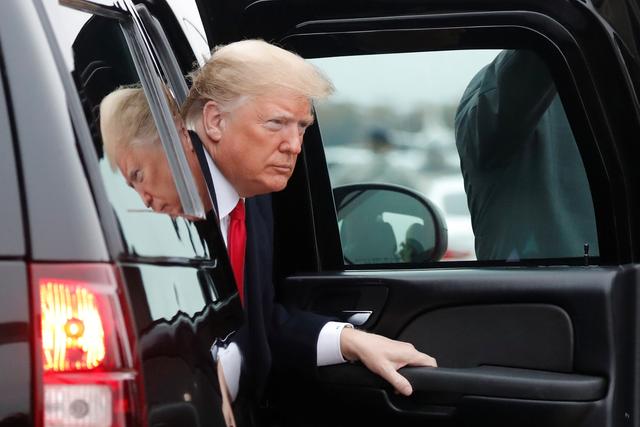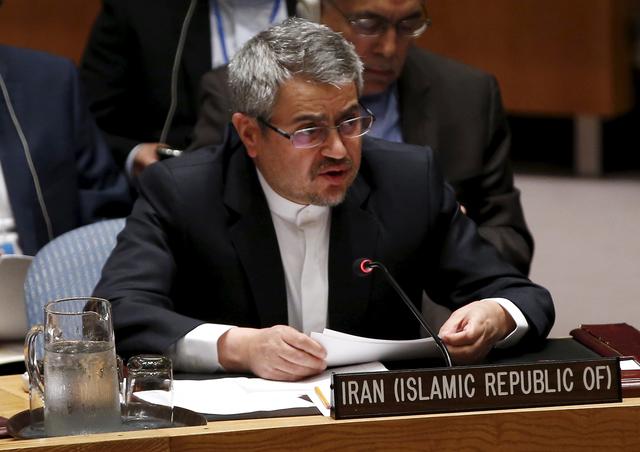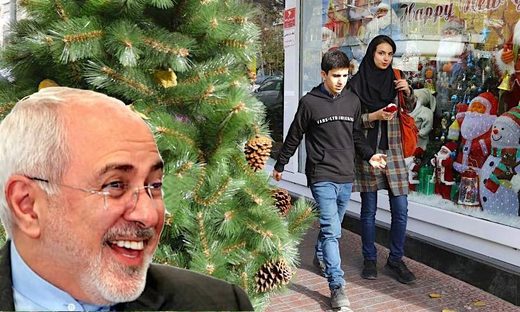angelburst29
The Living Force
November 6, 2018 - US Sanctions against Iran are not legitimate: Russia's Lavrov
U.S. sanctions against Iran are not legitimate: Russia's Lavrov | Reuters

Russian Foreign Minister Sergei Lavrov speaks during a joing news conference with his Spanish counterpart Josep Borrell (not pictured) at the foreign ministry in Madrid, Spain, November 6, 2018. REUTERS/Sergio Perez
Russian Foreign Minister Sergei Lavrov said on Tuesday that U.S. sanctions on Iran were not legitimate, in Moscow's first official comment since Washington restored sanctions on Tehran.
Lavrov said Moscow, itself a target of separate U.S. sanctions, expected there would be ways to pursue economic cooperation with Iran despite the re-imposition of sanctions on Monday on the country’s oil, banking and transport sectors.
Speaking in Madrid, Lavrov said Washington had used “unacceptable methods” to pressure operators of the SWIFT global financial network into cutting off Iranian banks.
Russia and its European partners were looking for ways to maintain economic ties with Tehran, he said after meeting his Spanish counterpart Josep Borrell, but provided no details.
Tehran said on Tuesday it had so far been able to sell as much oil as it needs despite U.S. pressure, but urged European countries that oppose the sanctions to do more to shield Iran.
November 5, 2018 - US reimposes Iran Sanctions, Tehran decries 'bullying'
U.S. reimposes Iran sanctions, Tehran decries 'bullying' | Reuters
The United States on Monday restored sanctions targeting Iran’s oil, banking and transportation sectors and threatened more action to stop its “outlaw” policies, steps the Islamic Republic called economic warfare and vowed to defy.
The measures are part of a wider effort by U.S. President Donald Trump to curb Tehran’s missile and nuclear programs and diminish the Islamic Republic’s influence in the Middle East, notably its support for proxies in Syria, Yemen and Lebanon.
Trump’s moves target Iran’s main source of revenue - its oil exports - as well as its financial sector, essentially making 50 Iranian banks and their subsidiaries off limits to foreign banks on pain of losing access to the U.S. financial system.
The return of the sanctions was triggered by Trump’s May 8 decision to abandon the 2015 Iran nuclear deal, negotiated with five other world powers during Democratic President Barack Obama’s administration. That agreement had removed many U.S. and other economic sanctions from Iran in return for Tehran’s commitment to curtail its nuclear program.
Trump denounced the deal because of time limits on some of Iran’s nuclear activities, as well as for its failure to address other Iranian activity that the United States does not like.
In abandoning the agreement and imposing sanctions that it had lifted as well as adding new ones, the United States is betting the economic pressure will force Iran to change its behavior and agree to a new, much more restrictive deal.
“The Iranian regime has a choice: it can either do a 180-degree turn from its outlaw course of action and act like a normal country, or it can see its economy crumble,” U.S. Secretary of State Mike Pompeo told reporters.
“We hope a new agreement with Iran is possible.”
Speaking before Pompeo detailed the U.S. sanctions, Iranian President Hassan Rouhani accused the United States of targeting ordinary Iranians and said the Islamic Republic would find a way to “continue to sell our oil ... to break sanctions.”
“The enemy is targeting our economy ... the main target of sanctions is our people,” he said. “This is an economic war against Iran.”
“BULLYING”
Some analysts are skeptical Iran will knuckle under to U.S. pressure, at least in the short term.
“The increasing pressures on Iran will not change the behavior of the regime any time soon,” said Dennis Ross, a former U.S. official now at the Washington Institute for Near East Policy.
Iranian Foreign Minister Mohammad Javad Zarif said U.S. “bullying” was backfiring by making Washington more isolated, a reference to other world powers opposed to the initiative. The other parties to the 2015 nuclear deal, Britain, China, France, Germany and Russia, have said they will stay in it.
The sanctions are designed, in part, to force Iran’s main customers to stop buying its oil. However, the United States gave temporary exceptions to eight importers - China, India, Greece, Italy, Taiwan, Japan, Turkey and South Korea - allowing them to keep buying from Iran.
Iraq has also been given an exemption, Brian Hook, the U.S. special representative for Iran, told reporters in a conference call, saying Iraq was working “on reducing Iran’s influence and opening Kirkuk, which would be another 200,000 barrels of oil.”
In June Iran said that Baghdad and Tehran had begun exchanging crude oil.
Crude from the Kirkuk field in northern Iraq is being shipped by truck to Iran. Tehran will use the oil in its refineries and will deliver the same amount of oil to Iraq’s southern ports, on the Gulf.
The sanctions also cover 50 Iranian banks and subsidiaries, more than 200 persons and vessels in its shipping sector, Tehran’s national airline, Iran Air, and more than 65 of its aircraft, a U.S. Treasury statement said.
The administration said it had toughened the sanctions by roughly 300 new designations on individuals and entities, and targeted more subsidiaries of Iranian companies than before.
EUROPEAN OPPOSITION
European powers that continue to back the nuclear deal said they opposed the reapplication of sanctions and major oil buyer China said it regretted the move.
Switzerland said it was holding talks with the United States and Iran about launching a humanitarian payment channel to help food and drugs keep flowing to Tehran.
U.S. sanctions permit trade in humanitarian goods such as food and pharmaceuticals but measures imposed on banks and trade restrictions could make such items more expensive as well as more difficult to pay for.
The United States will allow non-proliferation civil nuclear work at Arak, Bushehr and Fordow in Iran “under the strictest scrutiny,” the State Department said on Monday.
The Belgium-based SWIFT financial messaging service said it is suspending some unspecified Iranian banks’ access to its messaging system in the interests of the stability and integrity of the global financial system.
The head of Iran’s Central Bank, Abdolnassr Hemmati, said the country has taken necessary banking measures to continue trade after the U.S. move, Iranian state TV said.
The European Union, France, Germany and Britain said they regretted the U.S. decision and would seek to protect European companies doing legitimate business with Tehran.
Diplomats told Reuters last month that a new EU mechanism to facilitate payments for Iranian oil exports should be legally in place by Nov. 4 but not operational until early next year.
Trump told reporters he wanted to impose the oil sanctions slowly so as not to “cause a shock to the market.”
Oil prices were mixed on Monday after a steep five-day fall. Brent crude LCOc1 futures rose 34 cents to settle at $73.17 a barrel. U.S. West Texas Intermediate (WTI) crude CLc1 futures fell 4 cents to settle at $63.10 a barrel.
Prices rallied to near four-year highs in early October on expectations the imposition of sanctions would create a global supply shortage. However, news of the waivers last week sent prices lower as top buyers would continue to import Iranian oil.
November 6, 2018 - Trump says he wants to go slower on sanctions for Iran's oil
Trump says he wants to go slower on sanctions for Iran's oil | Reuters

U.S. President Donald Trump exits the presidential limousine prior to departing Washington on a campaign trip at Joint Base Andrews in Maryland, U.S., November 5, 2018. REUTERS/Carlos Barria
U.S. President Donald Trump on Monday said he wants to impose sanctions on Iran's oil gradually, citing concerns about shocking energy markets and causing global price spikes.
“With the oil, it’s very interesting. We have the toughest sanctions ever imposed, but on oil we want to go a little bit slower because I don’t want to drive (up) the oil prices in the world,” he told reporters before flying to a campaign event. “This has nothing to do with Iran... I could get the Iran oil down to zero immediately but it would cause a shock to the market. I don’t want to lift oil prices.”
The United States on Monday restored sanctions targeting Iran’s oil, banking and transport sectors and threatened more action, part of a wider effort to curb Tehran’s missile and nuclear programs and diminish the Islamic Republic’s influence in the Middle East, notably its support for proxies in Syria, Yemen and Lebanon. Trump’s moves target Iran’s main source of revenue, its oil exports, as well as its financial sector.
“If you notice, oil prices are going down very substantially, despite the fact that already half of their capacity is gone,” Trump said, adding “it will be a gradual” imposition of oil sanctions.
On Monday, international benchmark Brent crude oil futures were up nearly 0.8 percent to $73.41 a barrel and U.S. crude futures were up 0.4 percent at $63.41.
November 5, 2018 - Iran tells UN Chief: US should be held accountable over Sanctions
Iran tells U.N. chief: U.S. should be held accountable over sanctions | Reuters

Iran's United Nations (U.N.) Ambassador Gholamali Khoshroo speaks at a United Nations Security Council meeting at the U.N. headquarters in New York, July 20, 2015. REUTERS/Mike Segar
The United Nations should hold the United States accountable for re-imposing sanctions on Monday to choke off Iran's oil and shipping industry, measures that defy a U.N. Security Council resolution, Iran's U.N. ambassador wrote in a letter to Secretary-General Antonio Guterres.
“The irresponsible conduct of the United States necessitates a collective response by the international community in order to uphold the rule of law, to prevent undermining diplomacy and to protect multilateralism,” Iranian U.N. Ambassador Gholamali Khoshroo wrote, calling for the United States to be held responsible.
November 6, 2018 - Iran says it is selling the oil it needs to, despite US pressure
Iran says it is selling the oil it needs to, despite U.S. pressure | Reuters
Iran said on Tuesday it had so far been able to sell as much oil as it needs despite U.S. pressure, but urged European countries that oppose the U.S. sanctions to do more to shield Iran.
U.S. sanctions against Iran are not legitimate: Russia's Lavrov | Reuters
Russian Foreign Minister Sergei Lavrov speaks during a joing news conference with his Spanish counterpart Josep Borrell (not pictured) at the foreign ministry in Madrid, Spain, November 6, 2018. REUTERS/Sergio Perez
Russian Foreign Minister Sergei Lavrov said on Tuesday that U.S. sanctions on Iran were not legitimate, in Moscow's first official comment since Washington restored sanctions on Tehran.
Lavrov said Moscow, itself a target of separate U.S. sanctions, expected there would be ways to pursue economic cooperation with Iran despite the re-imposition of sanctions on Monday on the country’s oil, banking and transport sectors.
Speaking in Madrid, Lavrov said Washington had used “unacceptable methods” to pressure operators of the SWIFT global financial network into cutting off Iranian banks.
Russia and its European partners were looking for ways to maintain economic ties with Tehran, he said after meeting his Spanish counterpart Josep Borrell, but provided no details.
Tehran said on Tuesday it had so far been able to sell as much oil as it needs despite U.S. pressure, but urged European countries that oppose the sanctions to do more to shield Iran.
November 5, 2018 - US reimposes Iran Sanctions, Tehran decries 'bullying'
U.S. reimposes Iran sanctions, Tehran decries 'bullying' | Reuters
The United States on Monday restored sanctions targeting Iran’s oil, banking and transportation sectors and threatened more action to stop its “outlaw” policies, steps the Islamic Republic called economic warfare and vowed to defy.
The measures are part of a wider effort by U.S. President Donald Trump to curb Tehran’s missile and nuclear programs and diminish the Islamic Republic’s influence in the Middle East, notably its support for proxies in Syria, Yemen and Lebanon.
Trump’s moves target Iran’s main source of revenue - its oil exports - as well as its financial sector, essentially making 50 Iranian banks and their subsidiaries off limits to foreign banks on pain of losing access to the U.S. financial system.
The return of the sanctions was triggered by Trump’s May 8 decision to abandon the 2015 Iran nuclear deal, negotiated with five other world powers during Democratic President Barack Obama’s administration. That agreement had removed many U.S. and other economic sanctions from Iran in return for Tehran’s commitment to curtail its nuclear program.
Trump denounced the deal because of time limits on some of Iran’s nuclear activities, as well as for its failure to address other Iranian activity that the United States does not like.
In abandoning the agreement and imposing sanctions that it had lifted as well as adding new ones, the United States is betting the economic pressure will force Iran to change its behavior and agree to a new, much more restrictive deal.
“The Iranian regime has a choice: it can either do a 180-degree turn from its outlaw course of action and act like a normal country, or it can see its economy crumble,” U.S. Secretary of State Mike Pompeo told reporters.
“We hope a new agreement with Iran is possible.”
Speaking before Pompeo detailed the U.S. sanctions, Iranian President Hassan Rouhani accused the United States of targeting ordinary Iranians and said the Islamic Republic would find a way to “continue to sell our oil ... to break sanctions.”
“The enemy is targeting our economy ... the main target of sanctions is our people,” he said. “This is an economic war against Iran.”
“BULLYING”
Some analysts are skeptical Iran will knuckle under to U.S. pressure, at least in the short term.
“The increasing pressures on Iran will not change the behavior of the regime any time soon,” said Dennis Ross, a former U.S. official now at the Washington Institute for Near East Policy.
Iranian Foreign Minister Mohammad Javad Zarif said U.S. “bullying” was backfiring by making Washington more isolated, a reference to other world powers opposed to the initiative. The other parties to the 2015 nuclear deal, Britain, China, France, Germany and Russia, have said they will stay in it.
The sanctions are designed, in part, to force Iran’s main customers to stop buying its oil. However, the United States gave temporary exceptions to eight importers - China, India, Greece, Italy, Taiwan, Japan, Turkey and South Korea - allowing them to keep buying from Iran.
Iraq has also been given an exemption, Brian Hook, the U.S. special representative for Iran, told reporters in a conference call, saying Iraq was working “on reducing Iran’s influence and opening Kirkuk, which would be another 200,000 barrels of oil.”
In June Iran said that Baghdad and Tehran had begun exchanging crude oil.
Crude from the Kirkuk field in northern Iraq is being shipped by truck to Iran. Tehran will use the oil in its refineries and will deliver the same amount of oil to Iraq’s southern ports, on the Gulf.
The sanctions also cover 50 Iranian banks and subsidiaries, more than 200 persons and vessels in its shipping sector, Tehran’s national airline, Iran Air, and more than 65 of its aircraft, a U.S. Treasury statement said.
The administration said it had toughened the sanctions by roughly 300 new designations on individuals and entities, and targeted more subsidiaries of Iranian companies than before.
EUROPEAN OPPOSITION
European powers that continue to back the nuclear deal said they opposed the reapplication of sanctions and major oil buyer China said it regretted the move.
Switzerland said it was holding talks with the United States and Iran about launching a humanitarian payment channel to help food and drugs keep flowing to Tehran.
U.S. sanctions permit trade in humanitarian goods such as food and pharmaceuticals but measures imposed on banks and trade restrictions could make such items more expensive as well as more difficult to pay for.
The United States will allow non-proliferation civil nuclear work at Arak, Bushehr and Fordow in Iran “under the strictest scrutiny,” the State Department said on Monday.
The Belgium-based SWIFT financial messaging service said it is suspending some unspecified Iranian banks’ access to its messaging system in the interests of the stability and integrity of the global financial system.
The head of Iran’s Central Bank, Abdolnassr Hemmati, said the country has taken necessary banking measures to continue trade after the U.S. move, Iranian state TV said.
The European Union, France, Germany and Britain said they regretted the U.S. decision and would seek to protect European companies doing legitimate business with Tehran.
Diplomats told Reuters last month that a new EU mechanism to facilitate payments for Iranian oil exports should be legally in place by Nov. 4 but not operational until early next year.
Trump told reporters he wanted to impose the oil sanctions slowly so as not to “cause a shock to the market.”
Oil prices were mixed on Monday after a steep five-day fall. Brent crude LCOc1 futures rose 34 cents to settle at $73.17 a barrel. U.S. West Texas Intermediate (WTI) crude CLc1 futures fell 4 cents to settle at $63.10 a barrel.
Prices rallied to near four-year highs in early October on expectations the imposition of sanctions would create a global supply shortage. However, news of the waivers last week sent prices lower as top buyers would continue to import Iranian oil.
November 6, 2018 - Trump says he wants to go slower on sanctions for Iran's oil
Trump says he wants to go slower on sanctions for Iran's oil | Reuters
U.S. President Donald Trump exits the presidential limousine prior to departing Washington on a campaign trip at Joint Base Andrews in Maryland, U.S., November 5, 2018. REUTERS/Carlos Barria
U.S. President Donald Trump on Monday said he wants to impose sanctions on Iran's oil gradually, citing concerns about shocking energy markets and causing global price spikes.
“With the oil, it’s very interesting. We have the toughest sanctions ever imposed, but on oil we want to go a little bit slower because I don’t want to drive (up) the oil prices in the world,” he told reporters before flying to a campaign event. “This has nothing to do with Iran... I could get the Iran oil down to zero immediately but it would cause a shock to the market. I don’t want to lift oil prices.”
The United States on Monday restored sanctions targeting Iran’s oil, banking and transport sectors and threatened more action, part of a wider effort to curb Tehran’s missile and nuclear programs and diminish the Islamic Republic’s influence in the Middle East, notably its support for proxies in Syria, Yemen and Lebanon. Trump’s moves target Iran’s main source of revenue, its oil exports, as well as its financial sector.
“If you notice, oil prices are going down very substantially, despite the fact that already half of their capacity is gone,” Trump said, adding “it will be a gradual” imposition of oil sanctions.
On Monday, international benchmark Brent crude oil futures were up nearly 0.8 percent to $73.41 a barrel and U.S. crude futures were up 0.4 percent at $63.41.
November 5, 2018 - Iran tells UN Chief: US should be held accountable over Sanctions
Iran tells U.N. chief: U.S. should be held accountable over sanctions | Reuters
Iran's United Nations (U.N.) Ambassador Gholamali Khoshroo speaks at a United Nations Security Council meeting at the U.N. headquarters in New York, July 20, 2015. REUTERS/Mike Segar
The United Nations should hold the United States accountable for re-imposing sanctions on Monday to choke off Iran's oil and shipping industry, measures that defy a U.N. Security Council resolution, Iran's U.N. ambassador wrote in a letter to Secretary-General Antonio Guterres.
“The irresponsible conduct of the United States necessitates a collective response by the international community in order to uphold the rule of law, to prevent undermining diplomacy and to protect multilateralism,” Iranian U.N. Ambassador Gholamali Khoshroo wrote, calling for the United States to be held responsible.
November 6, 2018 - Iran says it is selling the oil it needs to, despite US pressure
Iran says it is selling the oil it needs to, despite U.S. pressure | Reuters
Iran said on Tuesday it had so far been able to sell as much oil as it needs despite U.S. pressure, but urged European countries that oppose the U.S. sanctions to do more to shield Iran.

 WG'sAR'sA
WG'sAR'sA










